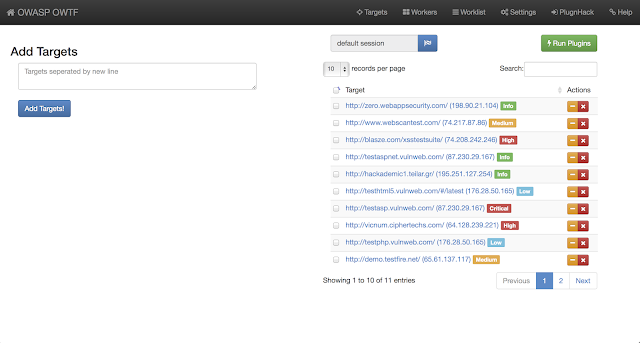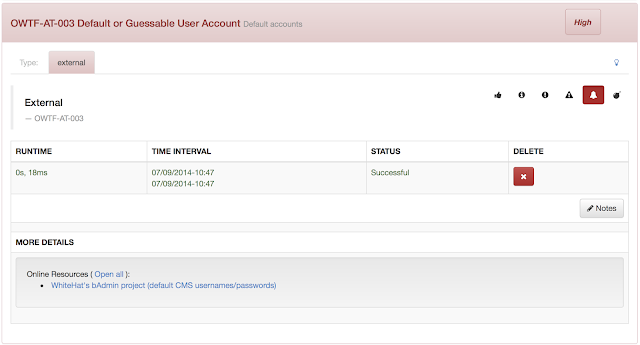OWASP OWTF is a project focused on penetration testing efficiency and alignment of security tests to security standards like the OWASP Testing Guide (v3 and v4), the OWASP Top 10, PTES and NIST so that pentesters will have more time to
- See the big picture and think out of the box
- More efficiently find, verify and combine vulnerabilities
- Have time to investigate complex vulnerabilities like business logic/architectural flaws or virtual hosting sessions
- Perform more tactical/targeted fuzzing on seemingly risky areas
- Demonstrate true impact despite the short timeframes we are typically given to test.
The tool is highly configurable and anybody can trivially create simple plugins or add new tests in the configuration files without having any development experience.
Note: This tool is however not a silverbullet and will only be as good as the person using it: Understanding and experience will be required to correctly interpret tool output and decide what to investigate further in order to demonstrate impact.
Requirements
OWTF is developed on KaliLinux and macOS but it is made for Kali Linux (or other Debian derivatives)
OWTF supports both Python2 and Python3.
Installation
Recommended:
Using a virtualenv is highly recommended!
pip install git+https://github.com/owtf/owtf#egg=owtfor clone the repo and
python setup.py install
If you want to change the database password in the Docker Compose setup, edit the environment variables in the docker-compose.yml file. If you prefer to override the environment variables in a .env file, use the file name owtf.env so that Docker Compose knows to include it.
To run OWTF on Windows or MacOS, OWTF uses Docker Compose. You need to have Docker Compose installed (check by docker-compose -v). After installing Docker Compose, simply run docker-compose up and open localhost:8009 for the OWTF web interface.
Install on OSX
Dependencies: Install Homebrew (https://brew.sh/) and follow the steps given below:
$ virtualenv <venv name> $ source <venv name>/bin/activate $ brew install coreutils gnu-sed openssl # We need to install 'cryptography' first to avoid issues $ pip install cryptography --global-option=build_ext --global-option="-L/usr/local/opt/openssl/lib" --global-option="-I/usr/local/opt/openssl/include" $ git clone <this repo> $ cd owtf $ python setup.py install # Run OWTF! $ owtf Features
- Resilience: If one tool crashes OWTF, will move on to the next tool/test, saving the partial output of the tool until it crashed.
- Flexible: Pause and resume your work.
- Tests Separation: OWTF separates its traffic to the target into mainly 3 types of plugins:
- Passive : No traffic goes to the target
- Semi Passive : Normal traffic to target
- Active: Direct vulnerability probing
- Extensive REST API.
- Has almost complete OWASP Testing Guide(v3, v4), Top 10, NIST, CWE coverage.
- Web interface: Easily manage large penetration engagements easily.
- Interactive report:
- Automated plugin rankings from the tool output, fully configurable by the user.
- Configurable risk rankings
- In-line notes editor for each plugin.
Links
- Project homepage
- IRC
- Wiki
- Slack and join channel
#project-owtf - User Documentation
- Youtube channel
- Slideshare
- Blog
Screenshots












